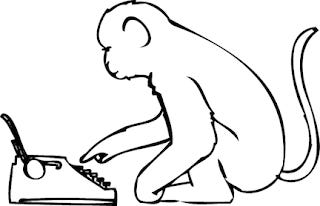(credit: KaterBegemot/wiki commons)
When you consider the physical evolution of the human species over the full sweep of time, our bodies have been changing only very gradually. Slowly it seems we get a bit bigger, a lot heavier and much less hairy.
So what about our behavior?
Well, we’ve gotten more sophisticated in using tools, building nests, crafting comfortable clothing, inventing vehicles that let us zoom around the planet at will, establishing routines that optimize pleasure and a bunch of other lifestyle stuff.
We’ve improved our medical knowledge and expanded our lifespans.
And we’ve been able to accomplish these things partly by inventing technologies, many by accident.
But if we had a giant mirror and could reflect down on ourselves as we are living now, you might conclude we are still exhibiting the behavior of monkeys in a zoo who have gotten a hold of a hijacked truckload of portable digital toys.
We’ve got them firmly grasped in our hairless little hands and we are staring at them when we are not turning them over and over, marveling at their magic. We look up now and then, looking side to side as of to make sure nobody’s going to discover us at this guilty pleasure, lest they swoop in and take them away from us.
We smile that smile of secret pleasure and we just keep looking at those screens as we hop around place to place on our way to nowhere in particular.
***
Technology is inherently neither good nor bad. It is officially neutral like Switzerland, although neutrality is also a relative concept. But if there are imperatives to the evolution of our species they probably include a technological component, i.e., we are going to continue to experiment and develop technologies that extend our ability to live our lives the way we thinkwe want to, and that extend our reach — physically, mentally and even possibly emotionally.
AI and robotics are just the latest examples.
No government or religion can stop this process though some will try.
But technological progress is also inherently disorienting and disruptive. It was becoming commonplace ten years or so back to describe each new upheaval of one of our traditional industries in terms that it had just been disrupted by the internet, or by a digital device, or a software application.
Suddenly it seemed that all of the middlemen, all of the intermediaries who made our society hold together were being thrown out of work. The technical term is that they were disintermediated.
Travel agents? Disintermediated.
Secretaries? Disintermediated.
Used car salesmen? Disintermediated.
Taxi drivers? Disintermediated.
Publishers? Disintermediated.
Journalists? Disintermediated.
I could go on (and on and on and on) but you get the idea. Some of the disrupters asked why did we need these people anyway, when we could just manipulate the new technologies to do everything without them.
Well, that’s a good question. But you know that old thing about being careful not to throw the baby out with the bathwater.
Beyond being an exceptionally odd phrase and concept, it’s nevertheless got more than a smidgeon of wisdom to it.
Because maybe we got something pretty valuable from those intermediaries who used to be in our lives. Something we need every bit as much as food, water, clothing, blankets when it’s cold and fans blowing fresh air when it’s hot.
We need to be cared for; we need to be taken care of now and then; we need to be loved.
Conversely, most of us need to be able to take care of other people. We need to be able to feel that we are needed.
It gives our lives meaning. It gives our jobs meaning. We need to feel we are helping makes things better, not worse.
As for fortune or fame, to quote Bob Dylan, “neither of them are to be what they claim.” (“Tom Thumb’s Blues”)
But using your time here to try and make the world just a little better for others, including those to come? That means everything.
(NOTE: I published the first version of this essay two years ago, the second last year. This is draft 3.0)
HEADLINES:
Grave peril of digital conspiracy theories: ‘What happens when no one believes anything anymore?’ (AP)
A State Supreme Court Just Issued the Most Devastating Rebuke of Dobbs Yet (Slate)
Impeaching Mayorkas Achieves Nothing (WSJ)
One Big Reason Migrants Are Coming in Droves: They Believe They Can Stay (NYT)
Climate activist Greta Thunberg goes on trial in London for blocking oil conference (ABC)
The European Union overcame Hungary veto’s threat to seal a 50 billion-euro aid package for Ukraine (AP)
Why Yemen’s Houthi rebels welcome conflict with the US (CNN)
Red Sea supply chain inflation may be peaking already, new trade data suggests (CNBC)
Biden signs executive order sanctioning West Bank settlers (WP)
Israel and Lebanon are prepping for a war neither country wants (AP)
China is facing a brutal reality as it desperately tries to fix its population decline problem (Business Insider)
Farmers descended on Brussels to press EU leaders to do more to help them with taxes, rising costs and cheap imports, throwing eggs at the European Parliament, starting fires near the building and setting off fireworks. Their revolt is fueling a narrative that the EU is riding roughshod over farmers. (Reuters)
A judge in London threw out a lawsuit by Donald Trump accusing former British spy Christopher Steele of making “shocking and scandalous claims” that were false and harmed his reputation. [AP]
Security fencing to surround Trump’s D.C. trial site, an echo of Jan. 6 barricades (WP)
Can This A.I.-Powered Search Engine Replace Google? It Has for Me. (NYT)
OpenAI says mysterious chat histories resulted from account takeover (ArsTechnica)
Mistral CEO confirms ‘leak’ of new open source AI model nearing GPT-4 performance (Venture Beat)
Generative A.I.’s Biggest Impact Will Be in Banking and Tech, Report Says (NYT)
Woman Takes Short Half-Hour Break From Being Feminist To Enjoy TV Show (The Onion)

No comments:
Post a Comment